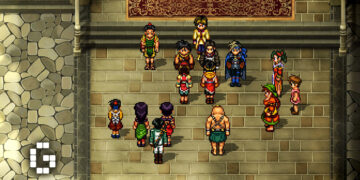The Outer Worlds had a lot riding on it, as Obsidian, the developer, had tasked itself with delivering what was to be some sort of spiritual successor to a certain Fallout: New Vegas which they had worked on. For the most part, they managed to achieve just that, but fell short in certain areas as well.

To best describe The Outer Worlds’ setting, imagine a world where the all out nuclear war in the Fallout series never took place, and Vault Tec went unchecked as they kept growing to the point the company owns the entire galaxy. The retrofuturistic aesthetic and its anti-capitalism caricature underlined by dark humour here is very on point and reminiscent of the aforementioned Fallout games. However, it is important to realise that this is pretty much where the similarity ends.

The game is not a sprawling sandbox one might immediately assume based on the comparisons between The Outer Worlds and Fallout: New Vegas, as it is instead more akin to games like Mass Effect or Knights Of The Old Republic in terms of gameplay. You will be exploring much of the galaxy with your ship, although locations are their own individual hubs. Within each hub, you will be capable of some level of exploration, but the experience if fairly limited, and there is little reason to traverse the map normally once you have quick travel unlocked.

Fortunately to make up for the smaller size of the locales, the denizens are interesting to interact with, particularly those living in Edgewater, the first planet which the game starts in. As a corporate colony, the population is made up almost entirely of employees who are disturbingly loyal to their paymasters and keen to do the best job they can, as failure to do so would result in retrenchment and subsequently death. Contrast this with the disgruntled workers who quit their jobs to set up their own little colony and the gang of marauders who make up the hostile faction on Edgewater.

After engaging in the first few quests the game has to offer, you eventually find yourself in a moral quandary where you must decide to either help the corporation or its former employees. Of course, you can choose to side with either, although the game does try to nudge you in a particular direction. The bigger issue at hand here is that your choice in the end does not really matter. Return to Edgewater after a while and you will notice that aside from some surface-level differences, hardly anything changes. Later choices matter even less, as you learn about the outcome of your decisions in a post-game slideshow. Given the pedigree of the developer and its experience, this comes off as somewhat disappointing.

Your party members, if you choose to have them, at least have had some thought put into them, so it is worth recruiting them alone for their stories. While not as meaningful as say the companions from Mass Effect, they do often participate in conversations, and you learn more about them and the NPCs they interact with this way. The same praise cannot shown to the NPCs unfortunately, as the majority are uninteresting and serve only as quest dispensers.

As a game set in the space equivalent of the wild west, combat plays a major emphasis here. While functional for the most part, it does come of as very lacking as well. Weapon variety is minimal though you will be able to mod them accordingly do have them perform a little differently, but even then that’s not a lot to speak of. Combat is by no means challenging as enemies fall into very predictable categories of the type that rushes the player, sniper types and critters. Ammo is plentiful and although weapons deteriorate, you will be able to easily repair them as you are never short of them, giving how generous the game is with when it comes to loot. If you so choose, you can ramp up the difficulty to its hardest, but it becomes more of a nuisance than a challenge, as you are required to do things like eat and sleep off injuries. Quick travel is limited and so are saves but you are able to circumvent it by going back to your ship to do all that. With the world being somewhat small, getting to your destination will not take too long anyway. If you do decide to walk, one of the game’s other weakness is highlighted here as well in how empty it feels. And speaking of the world, it is remarkable how little friction there can be at times. Getting caught stealing has barely any consequence and people do not mind you entering their abode. This is of course not a big issue in most RPGs, but for something that tries real hard to remind players that this is some spiritual successor to Fallout: New Vegas, the world does not feel as lived-in.

Overall to be fair to The Outer Worlds, the journey from start to finish is enjoyable. There is nothing new here at all, but is a good showcase of what Obsidian is capable of. Perhaps given more time and an even bigger budget, the inevitable sequel could address the little flaws that stop it from being a modern classic.
Join Us!
We are recruiting! If you want to break into the gaming media industry, don't miss out on the golden opportunity. Find out more: Malaysia. Overseas.The Review
The Outer Worlds Review
Fallout: New Vegas in space. More or less.
PROS
- Fallout: New Vegas in space
CONS
- Uninspired combat
- Locations not as lived-in as they should be









![[EXCLUSIVE] Interview with the Minds Behind of Den of Wolves – 10 Chambers’ New Sci-Fi Heist FPS](https://cdn.gamerbraves.com/2025/04/Den-of-Wolves_Interview_FI-360x180.jpg)












![[BlizzCon 2019] Diablo Immortal sneak peek](https://cdn.gamerbraves.com/2019/11/diablo-immortal-feature-n-75x75.jpg)
![[GUIDE] Farming Nightflower Pollen in Monster Hunter Wilds](https://cdn.gamerbraves.com/2025/03/MHWilds-Pollen_Guide_FI-360x180.jpg)


![[GUIDE] Artian Weapons in Monster Hunter Wilds – From Unlocking to Endgame Optimization](https://cdn.gamerbraves.com/2025/03/MHWilds-Artian-Weapons_Guide_FI-360x180.jpg)
![[GUIDE] Best Gathering Locations by Materials in Monster Hunter Wilds](https://cdn.gamerbraves.com/2025/02/MHWilds-Materials-Locations_News_FI-360x180.jpg)
![[GUIDE] Best Pop-Up Camp Locations in Monster Hunter Wilds](https://cdn.gamerbraves.com/2025/02/MHWilds-Pop-Up-Camp-Locations_Guide_FI-360x180.jpg)